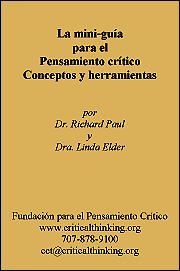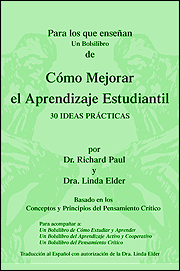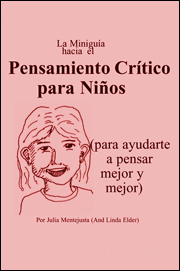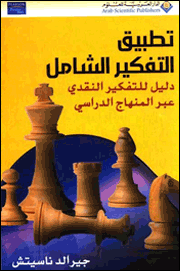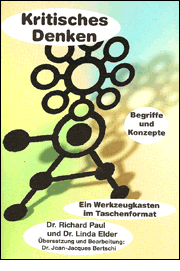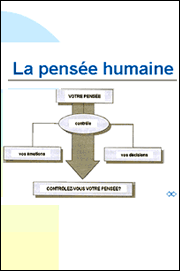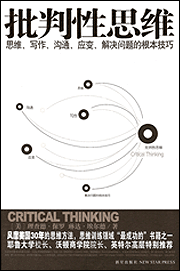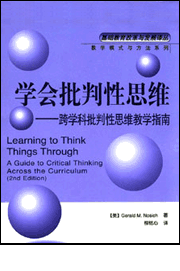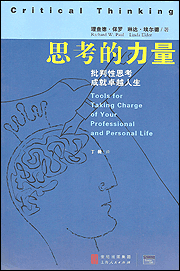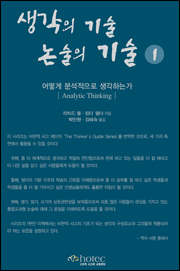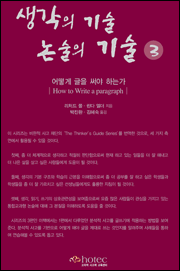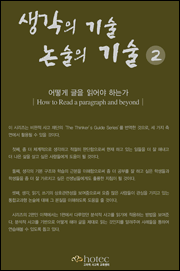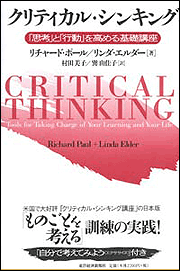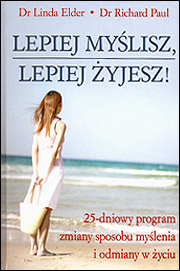The Foundation for Critical Thinking has translated a limited number of our resources into multiple languages. These "human translated" resources are of academic quality and are available in menu below.
Translations of our Critical Thinking Resources
{"id":393,"title":"Translations of our Critical Thinking Resources","author":"","content":"<p><span id=\"__mce\" class=\"f2\"> </span></p>\r\n<table border=\"0\" cellspacing=\"0\" cellpadding=\"2\" width=\"98%\">\r\n<tbody>\r\n<tr>\r\n<td colspan=\"3\" height=\"10\">\r\n<hr />\r\n<strong><span style=\"color: #000080;\">Recursos&nbsp;en&nbsp;Espa&ntilde;ol &nbsp; -&nbsp;\tResources in Spanish &nbsp;&nbsp;<a style=\"color: white;\" href=\"/resources/international/spanish.cfm\">Ver todos los recursos Espa&ntilde;oles <!-- View All Spanish Resources ---></a></span></strong></td>\r\n</tr>\r\n<tr>\r\n<td width=\"33%\" align=\"center\"><strong><span style=\"color: #000080;\"><a style=\"color: white;\" href=\"/resources/international/spanish.cfm\">Pensamiento cr&iacute;tico Conceptos y herramientas<br /> <img src=\"/images/Spanish-Concepts-cover.gif\" border=\"0\" alt=\"\" width=\"180\" height=\"271\" /></a></span></strong></td>\r\n<td width=\"33%\" align=\"center\"><strong><span style=\"color: #000080;\"><a style=\"color: white;\" href=\"/resources/international/Spanish.cfm\"> C&oacute;mo Mejorar el Aprendizaje Estudiant&iacute;l<br /> <br /> <img src=\"/images/SP_Student_Learning.gif\" border=\"0\" alt=\"\" width=\"180\" height=\"271\" /></a></span></strong></td>\r\n<td width=\"33%\" align=\"center\"><strong><span style=\"color: #000080;\"><a style=\"color: white;\" href=\"/resources/international/Spanish.cfm\"> Gu&iacute;a de los ni&ntilde;os al pensamiento cr&iacute;tico<br /> <br /> <img src=\"/images/SP-CTforChildren.gif\" border=\"0\" alt=\"\" width=\"180\" height=\"271\" /></a></span></strong></td>\r\n</tr>\r\n<tr>\r\n<td colspan=\"3\" height=\"10\">\r\n<hr />\r\n</td>\r\n</tr>\r\n<tr valign=\"middle\">\r\n<td width=\"33%\" align=\"center\"><strong><span style=\"color: #000080;\"><a style=\"color: white;\" href=\"/resources/international/arabic.cfm\">Resources&nbsp;in&nbsp;Arabic <br /> <img src=\"/images/Arabic-NosichCover.gif\" border=\"0\" alt=\"Resources in Arabic\" width=\"180\" height=\"271\" /> </a></span></strong></td>\r\n<td width=\"33%\" align=\"center\"><strong><span style=\"color: #000080;\"><a style=\"color: white;\" href=\"/resources/german.cfm\"> Betriebsmittel&nbsp;auf&nbsp;Deutsch<br /> Resources in German<br /> <img src=\"/images/GR-Kritisches_Denken.gif\" border=\"0\" alt=\"Kritisches Denken - Betriebsmittel auf Deutsch Resources \" width=\"180\" height=\"271\" /></a></span></strong></td>\r\n<td width=\"33%\" align=\"center\"><strong><span style=\"color: #000080;\"><a style=\"color: white;\" href=\"/resources/international/french.cfm\"> Ressources&nbsp;en&nbsp;Fran&ccedil;ais<br /> Resources in French<br /> <img src=\"/images/French-La_pensee_humaine.gif\" border=\"0\" alt=\"Ressources en Fran&ccedil;ais Resources in French\" width=\"180\" height=\"271\" /></a></span></strong></td>\r\n</tr>\r\n<tr>\r\n<td colspan=\"3\" height=\"10\">\r\n<hr />\r\n<strong><span style=\"color: #000080;\">&nbsp; <a style=\"color: white; text-decoration: none;\" href=\"/resources/international/Chinese.cfm\"> Resources in Chinese Simplified</a></span></strong></td>\r\n</tr>\r\n<tr>\r\n<td width=\"33%\" align=\"center\"><strong><span style=\"color: #000080;\"><a style=\"color: white;\" href=\"/resources/international/Chinese.cfm\"> Tools for Taking Charge of Your<br /> Learning and Your Life <br /> <img src=\"/images/CH-Tools_Learning_Life-SM.gif\" border=\"0\" alt=\"Resources in Chinese\" width=\"180\" height=\"271\" /> </a></span></strong></td>\r\n<td width=\"33%\" align=\"center\"><strong><span style=\"color: #000080;\"><a style=\"color: white;\" href=\"/resources/international/Chinese.cfm\"> Learning to Think Things Through<br /> <br /> <img src=\"/images/CH-LearningThinkThings.gif\" border=\"0\" alt=\"\" width=\"180\" height=\"271\" /></a></span></strong></td>\r\n<td width=\"33%\" align=\"center\"><strong><span style=\"color: #000080;\"><a style=\"color: white;\" href=\"/resources/international/Chinese.cfm\">Tools for Taking charge of your<br /> Professional and Personal Life <br /> <img src=\"/images/CH-Tools_Professional_cover.gif\" border=\"0\" alt=\"\" width=\"180\" height=\"271\" /> </a></span></strong></td>\r\n</tr>\r\n<tr>\r\n<td colspan=\"3\" height=\"10\">\r\n<hr />\r\n<strong><span style=\"color: #000080;\">&nbsp;Resources&nbsp;in&nbsp;Korean</span></strong></td>\r\n</tr>\r\n<tr>\r\n<td width=\"33%\" align=\"center\"><a style=\"color: white;\" href=\"/resources/international/Korean.cfm\"> Analytic Thinking<br /> <br /> <img src=\"/images/KoreanAnalyticcover-Small.gif\" border=\"0\" alt=\"\" width=\"180\" height=\"271\" /></a></td>\r\n<td width=\"33%\" align=\"center\"><a style=\"color: white;\" href=\"/resources/international/Korean.cfm\"> How to Write a Paragraph<br /> <br /> <img src=\"/images/K-Write_Paragraph-SM.gif\" border=\"0\" alt=\"\" width=\"180\" height=\"271\" /></a></td>\r\n<td width=\"33%\" align=\"center\"><a style=\"color: white;\" href=\"/resources/international/Korean.cfm\"> How to Write a Paragraph<br /> <br /> <img src=\"/images/K-Read_Paragraph-SM.gif\" border=\"0\" alt=\"\" width=\"180\" height=\"271\" /></a></td>\r\n</tr>\r\n<tr>\r\n<td colspan=\"3\" height=\"10\">\r\n<hr />\r\n</td>\r\n</tr>\r\n<tr>\r\n<td width=\"33%\" align=\"center\"><a style=\"color: white;\" href=\"/resources/japanese.cfm\">Resources in Japanese<br /> <img src=\"/images/resources-kanji.gif\" border=\"0\" alt=\"Resources in Japanese\" width=\"76\" height=\"16\" /><br /> <img src=\"/images/Japan-ToolsLearningLife.gif\" border=\"0\" alt=\"Book: Tools for Taking Charge of your Learning and your Life\" width=\"180\" height=\"271\" /> </a></td>\r\n<td width=\"33%\" align=\"center\"><a style=\"color: white;\" href=\"/resources/international/Polish.cfm\"> Resources in Polish<br /> <br /> <img src=\"/images/Polish-25DaysCover-SM.jpg\" border=\"0\" alt=\"Resources in Polish\" width=\"180\" height=\"271\" /></a></td>\r\n<td width=\"33%\" align=\"center\"><a style=\"color: white;\" href=\"/resources/international/Turkish.cfm\"> Resources&nbsp;in&nbsp;Turkish<br /> <br /> <img src=\"/images/Turkish-Concepts-Tools_Guide.gif\" border=\"0\" alt=\"\" width=\"180\" height=\"271\" /></a></td>\r\n</tr>\r\n</tbody>\r\n</table>\r\n<p><br style=\"clear: both;\" /></p>","public_access":"1","public_downloads":"1","sku":"","files":{},"images":{}}





